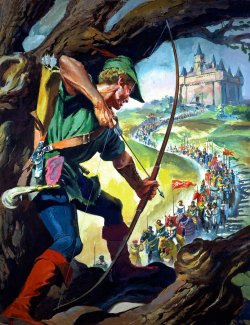- Sep 22, 2013
- 4,956
- 250
- 85
The concepts of free will and sovereignty are important in evaluations of governance and art. As human thinking beings, we want unlimited rights to think about whatever we wish to entertain for our imagination, but as citizens of a state or members of a society, we're obligated to observe/respect the rights and concerns (and wishes) of others.
Free will is the ability (or right) to choose between two courses of action without external guidance or commands. Sovereignty involves the coordination of a government to honor the basic needs/rights of each citizen without inference or harassment from other states/governments.
We might compare free will and sovereignty in the analysis of major wars, such as the American Civil War (which was fought basically to end slavery of African-Americans in the USA) and World War II (which was fought between the Allied and Axis powers over the genocidal extermination of millions of helpless and arguably homeless Jews).
When the American Civil War broke out, advocates and critics talked about free will and the strange desire of African slaves to not support Abolition and hence 'maintain' their known and comfortable way of life. However, there was also talk about African slaves simply not feeling safe enough to voice their human cries of freedom in a white-dominated America which just might ostracize them for expressing the desire to end slavery. The American government did not want outside interference and hence required a measure of sovereignty to solve its own problems, which is partly why Abraham Lincoln was considered such a practical leader during that war.
During World War II (abbreviated, WWII), the world was shocked when Nazi Germany declared its intention to form a completely unique (and revolutionary) form of government which would prevent barbarians, nomads, and Jewish tax-collectors from easily wandering into their lands (un-unified Germania) and create fortresses of profiteerism. The Nazis engaged in the methodical and barbarous killing of millions of Jews who were stranded in Germany and other parts of Europe and left as hapless targets for Hitler's Reich. During WWII, social critics and historians talked about the free will of Jews being threatened by forces of darkness and the sovereignty of the entire world being endangered by Hitler's bizarre 'political mission.'
So free will and sovereignty are important in evaluating the contours of war and peace and how social critics evaluate war and peace and the human imagination and what comprises 'permissible' forms of expression. An artist wants the right to make whatever he/she thinks is 'artistic' but society (critics) retain the sovereignty-right not to have to purchase/celebrate the artist's creative expressions. Perhaps an African-American in modern-day America might want the sovereignty-right to refuse to purchase a Ku Klux Klan painting made by a Confederate-loyalist of the American Civil War, since such a painting reminds him/her of the 'ghosts of slavery' and the complexity of Abolition.
One thing is sure, we really can't talk about free will without addressing the concept of sovereignty. That's really the 'magic' of life on Earth --- networking. Without considerations about teamwork, there's nothing that 'special' about free will. Free will (and liberty) are vital in evaluations of democracy, but we also have to think about how sovereignty shapes our analyses of a 'healthy government.'
====
Imagine a mad-scientist or brooding writer working in his lab/den for hours into the night for one whole year, wrestling with the psychological/philosophical problem of free will and its contradiction to sovereignty. Such a hypothetical scientist/writer might think about the complications of evolution, deviant behaviors such as cannibalism, and methods of marketing/governing new scientific breakthroughs such as genomics.

A painting of a 'primitive' society engaging in cannibalism stirs our fears about deviance and social control. We frown upon cannibalism in modern civilization but to the early natives of ancient worlds, such practices were considered ritual or even religious. Cannibalism has been basically 'outlawed' since even practicing 'members' of cannibalistic societies who were 'volunteers' for human sacrifice were relieved when cannibalism was outlawed! This is not unlike slavery in the USA.

A new age comic book speaks to very wide pedestrian imaginations about civics, justice, and sometimes even vigilantism-daydreams. Vigilantism involves a regular citizen/civilian choosing to become an 'executor of law' or even 'punisher' without official recognition by the government/authorities. A vigilantism-daydream comic book in the modern age about a 'mechanical' experimental cop might stir our new age interests in traffic, population-control, civil crimes, political corruption, and even basic human fascination with action and drama. We might think of a comic book character such as RoboCop compelling us to ask questions such as, "Should free will be regularly admonished so state-sovereignty is more 'efficiently' orchestrated?"

An ancient-world mythology about a demonic-deity such as Medusa (an otherwise attractive woman whose head is nevertheless comprised of snakes and can turn men into stone with her deadly and poisonous gaze) reminds us of the value of free will and sovereignty. A man, naturally interested in sex, is drawn to Medusa's hypnotic charms, but when he violates her sovereignty and invades her 'lair' to try to rape her, she turns him into stone forever. Such a mythology-tale obviously incites our concerns regarding the contouring of personal liberties with the complexities of public welfare.

In contrast, an ambiguous character such as Robin Hood, who was otherwise simply a thief who nevertheless valiantly stole from the rich so he could bestow fortunes upon the impoverished who were neglected by a corrupt monarchy/government, makes us think more deeply about free will and sovereignty. Robin Hood was an 'outlaw' but he seemed to think greatly about social welfare and the needs of the poor. Obviously, cops today don't cite Robin Hood in evaluations of thievery, since civilization doesn't want to 'condone' theft. Perhaps, then, Robin Hood reminds us of why/how 'radicalism' is sometimes 'necessary' to provide forms of sanity in times of great social corruption.

TRUMP: Are you a fan of Robin Hood, Carter?
CARTER: I don't think any Republicans are Robin Hood fans, Mr. President!
TRUMP: You're right, and I'll tell you why --- fortune is a federal coffer.
CARTER: In other words, Robin Hood was a 'tragic hero.'
TRUMP: Precisely, Carter; the state is obligated to ensure social programs.
CARTER: Kids want to read Robin Hood comics in America, however.
TRUMP: Well, consumerism is not the same as capitalism.
CARTER: Maybe not, but what do we say to anti-TrumpUSA critics who hate conservatism?
TRUMP: We remind them that governance is more important than liberty!
CARTER: That's arguable; Democrats argue liberty is more vital than federalism.
TRUMP: Would you want a society of free-thinkers or one of civil servants?
CARTER: Capitalism differs from communism in that it promotes personal happiness.
TRUMP: Yes, that's true; that's why Republicans feel the need to defend patriotism.
CARTER: Democrats, on the other hand, often praise 'creative-thinking.'
====


Free will is the ability (or right) to choose between two courses of action without external guidance or commands. Sovereignty involves the coordination of a government to honor the basic needs/rights of each citizen without inference or harassment from other states/governments.
We might compare free will and sovereignty in the analysis of major wars, such as the American Civil War (which was fought basically to end slavery of African-Americans in the USA) and World War II (which was fought between the Allied and Axis powers over the genocidal extermination of millions of helpless and arguably homeless Jews).
When the American Civil War broke out, advocates and critics talked about free will and the strange desire of African slaves to not support Abolition and hence 'maintain' their known and comfortable way of life. However, there was also talk about African slaves simply not feeling safe enough to voice their human cries of freedom in a white-dominated America which just might ostracize them for expressing the desire to end slavery. The American government did not want outside interference and hence required a measure of sovereignty to solve its own problems, which is partly why Abraham Lincoln was considered such a practical leader during that war.
During World War II (abbreviated, WWII), the world was shocked when Nazi Germany declared its intention to form a completely unique (and revolutionary) form of government which would prevent barbarians, nomads, and Jewish tax-collectors from easily wandering into their lands (un-unified Germania) and create fortresses of profiteerism. The Nazis engaged in the methodical and barbarous killing of millions of Jews who were stranded in Germany and other parts of Europe and left as hapless targets for Hitler's Reich. During WWII, social critics and historians talked about the free will of Jews being threatened by forces of darkness and the sovereignty of the entire world being endangered by Hitler's bizarre 'political mission.'
So free will and sovereignty are important in evaluating the contours of war and peace and how social critics evaluate war and peace and the human imagination and what comprises 'permissible' forms of expression. An artist wants the right to make whatever he/she thinks is 'artistic' but society (critics) retain the sovereignty-right not to have to purchase/celebrate the artist's creative expressions. Perhaps an African-American in modern-day America might want the sovereignty-right to refuse to purchase a Ku Klux Klan painting made by a Confederate-loyalist of the American Civil War, since such a painting reminds him/her of the 'ghosts of slavery' and the complexity of Abolition.
One thing is sure, we really can't talk about free will without addressing the concept of sovereignty. That's really the 'magic' of life on Earth --- networking. Without considerations about teamwork, there's nothing that 'special' about free will. Free will (and liberty) are vital in evaluations of democracy, but we also have to think about how sovereignty shapes our analyses of a 'healthy government.'
====
Imagine a mad-scientist or brooding writer working in his lab/den for hours into the night for one whole year, wrestling with the psychological/philosophical problem of free will and its contradiction to sovereignty. Such a hypothetical scientist/writer might think about the complications of evolution, deviant behaviors such as cannibalism, and methods of marketing/governing new scientific breakthroughs such as genomics.

A painting of a 'primitive' society engaging in cannibalism stirs our fears about deviance and social control. We frown upon cannibalism in modern civilization but to the early natives of ancient worlds, such practices were considered ritual or even religious. Cannibalism has been basically 'outlawed' since even practicing 'members' of cannibalistic societies who were 'volunteers' for human sacrifice were relieved when cannibalism was outlawed! This is not unlike slavery in the USA.
A new age comic book speaks to very wide pedestrian imaginations about civics, justice, and sometimes even vigilantism-daydreams. Vigilantism involves a regular citizen/civilian choosing to become an 'executor of law' or even 'punisher' without official recognition by the government/authorities. A vigilantism-daydream comic book in the modern age about a 'mechanical' experimental cop might stir our new age interests in traffic, population-control, civil crimes, political corruption, and even basic human fascination with action and drama. We might think of a comic book character such as RoboCop compelling us to ask questions such as, "Should free will be regularly admonished so state-sovereignty is more 'efficiently' orchestrated?"

An ancient-world mythology about a demonic-deity such as Medusa (an otherwise attractive woman whose head is nevertheless comprised of snakes and can turn men into stone with her deadly and poisonous gaze) reminds us of the value of free will and sovereignty. A man, naturally interested in sex, is drawn to Medusa's hypnotic charms, but when he violates her sovereignty and invades her 'lair' to try to rape her, she turns him into stone forever. Such a mythology-tale obviously incites our concerns regarding the contouring of personal liberties with the complexities of public welfare.

In contrast, an ambiguous character such as Robin Hood, who was otherwise simply a thief who nevertheless valiantly stole from the rich so he could bestow fortunes upon the impoverished who were neglected by a corrupt monarchy/government, makes us think more deeply about free will and sovereignty. Robin Hood was an 'outlaw' but he seemed to think greatly about social welfare and the needs of the poor. Obviously, cops today don't cite Robin Hood in evaluations of thievery, since civilization doesn't want to 'condone' theft. Perhaps, then, Robin Hood reminds us of why/how 'radicalism' is sometimes 'necessary' to provide forms of sanity in times of great social corruption.

TRUMP: Are you a fan of Robin Hood, Carter?
CARTER: I don't think any Republicans are Robin Hood fans, Mr. President!
TRUMP: You're right, and I'll tell you why --- fortune is a federal coffer.
CARTER: In other words, Robin Hood was a 'tragic hero.'
TRUMP: Precisely, Carter; the state is obligated to ensure social programs.
CARTER: Kids want to read Robin Hood comics in America, however.
TRUMP: Well, consumerism is not the same as capitalism.
CARTER: Maybe not, but what do we say to anti-TrumpUSA critics who hate conservatism?
TRUMP: We remind them that governance is more important than liberty!
CARTER: That's arguable; Democrats argue liberty is more vital than federalism.
TRUMP: Would you want a society of free-thinkers or one of civil servants?
CARTER: Capitalism differs from communism in that it promotes personal happiness.
TRUMP: Yes, that's true; that's why Republicans feel the need to defend patriotism.
CARTER: Democrats, on the other hand, often praise 'creative-thinking.'
====


